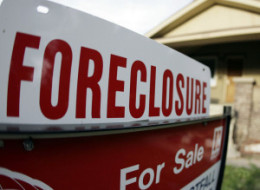Don't Look Back: Major Players Continue To 'Walk Away' From Poor Mortgages
As underwater homeowners around the country despair over whether to keep paying their mortgages or just walk away, investors in the largest residential real estate deal in U.S. history have just walked away from 11,232 properties in one fell swoop.
On Monday a group led by Tishman Speyer Properties gave up the 56-building, 11,232-unit Peter Cooper Village and Stuyvesant Town apartment complex in Manhattan, turning the properties over to its creditors after defaulting on some $4.4 billion in debt. The group decided to "transfer control and operation of the property...to the lenders," it told the Wall Street Journal. The $5.4 billion acquisition in 2006 was the single biggest residential property purchase in U.S. history.
It's now worth an estimated $1.8 billion, putting the properties' owners "underwater."
Four years later, the joint venture by Tishman and BlackRock Inc. is part of what is undoubtedly the biggest walk-away in mortgage history.
On Wall Street, it's okay to walk away from your mortgage.
"We basically walked away from it," said Clark McKinley, a spokesman for the California Public Employees' Retirement System [CalPERS], the nation's biggest municipal pension fund. CalPERS, one of several investors in the venture, wrote off its $500 million investment, McKinley said.
"It's underwater, anyway, so we've lost it," he added. "We took our medicine, and we're learning from it."
The Tishman-led venture is just the latest Wall Street walk-away.

Last month, Morgan Stanley, the country's sixth-biggest bank by assets, walked away from five San Francisco office buildings it purchased as part of a landmark $2.43 billion deal near the height of the real estate boom. The $770 billion firm called it a "a negotiated transfer to our lenders."
So if Wall Street can do it, why can't homeowners?
About a quarter of homeowners with a mortgage -- estimates range from 11-15 million -- are currently underwater on their mortgages, meaning they owe more than the property is worth. All of the mortgages in the state of Nevada are worth more than the underlying properties, according to real estate research firm First American CoreLogic, making the whole state virtually underwater.
But struggling homeowners aren't getting the kind of mortgage relief they need, experts say. Principal cuts are rare. In fact, more than 70 percent of mortgage modifications involve an increase in the principal owed, according to a recent report by state regulators.
Meanwhile, about half of mortgages that are modified eventually re-default anyway. The kind of mortgage modifications most prevalent are simply delaying the inevitable, according to a review of mortgage modification data.
With homeowners at the mercy of their lenders, unable to get relief on their home mortgages in bankruptcy court, and unlikely to see a return in their homes' values to their boomtime highs, they don't have too many options.
Enter "strategic defaults" -- a fancy way of saying "walking away."
More than one million homeowners went that route last year, nearly double the amount in 2008 and more than four times the level in 2007, according to a recent analysis by the credit reporting company Experian and Oliver Wyman, a management consulting firm. A study by a team of university academics found that a quarter of defaults are strategic.
The trigger, researchers say, is negative equity. When the value of a house is less than what the bank is owed, borrowers have good reason to break their contracts and walk away.
As Brent T. White, a law professor at the University of Arizona, notes, "there is in fact a huge financial upside to strategic default for seriously underwater homeowners -- an upside that is routinely ignored by the media, credit counseling agencies, and other political and economic institutions in 'informing' homeowners about the consequences of default."
White argues that homeowners should act like corporations, or like Morgan Stanley and Tishman Speyer -- maximize profits and minimize losses. Walking away from an underwater mortgage makes sense, White says.
But distressed homeowners are often guilted into paying their mortgages, White argues.
Former Treasury Secretary Hank Paulson once said: "And let me emphasize, any homeowner who can afford his mortgage payment but chooses to walk away from an underwater property is simply a speculator - and one who is not honoring his obligations."
The head of the Mortgage Bankers Association, John Courson, played up the moral argument against walking away, telling the Wall Street Journal last month: "What about the message they will send to their family and their kids and their friends?
But corporations and businesses don't play by those rules. Like CalPERS's McKinley said, "You come to a point where you write it off or stay in the game. If you want to stay in you got to put in more capital. We reached our limit on that. It was not a prudent thing to put more money into it.
"You get to a point where you can't keep throwing good money after bad," he said. "These are illiquid investments. You gotta fish or cut bait."
As for homeowners walking away en masse -- perhaps lenders' biggest housing-related fear -- McKinley added: "We're hopeful that won't happen."








First Posted: 01-25-10 03:56 PM | Updated: 01-25-10 09:05 PM